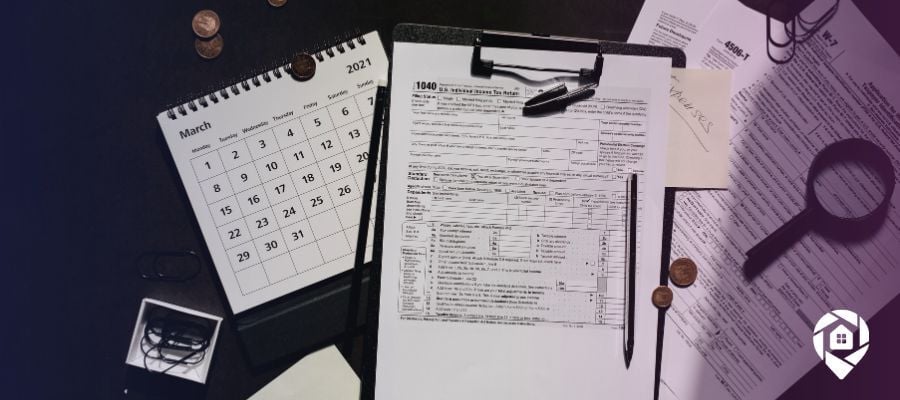
Do Landlords Pay Taxes on Rent? What You Didn't Know About Owning Rentals

Becoming a landlord can be an exciting step toward building wealth through real estate. But it’s not just about collecting rent every month — it also means handling important financial responsibilities, like paying taxes on rental income. Many new landlords are surprised to learn just how many rules apply when it comes to reporting and paying taxes on the money they earn from tenants.
So, do landlords have to pay taxes on rent? The short answer is yes.
Any money you receive from renting out property is considered rental income and must be reported to the IRS. But the process isn’t as scary as it sounds. When you understand the basics of how to file rental income tax, it becomes much easier to stay organized and avoid trouble during tax season.
This guide breaks down everything you need to know — in simple terms — so you can stay compliant, keep more of your income, and feel confident as you grow your rental property investment. *Note that we are not financial advisors, so please check this over with a financial advisor versed in rental income and taxes in your state.
Understanding Rental Income Taxation Basics
If you’re a landlord, one of the first things you need to know is that money earned from renting out property is considered income — and yes, you have to pay taxes on it. This might sound overwhelming at first, but once you understand what counts as rental income, it becomes easier to manage.
Rental income is more than just the rent check you get every month. The IRS includes several types of payments in this category. Here’s a breakdown:
- Monthly Rent Payments – This is the most common type of rental income. It includes the money tenants pay you for living in your property.
- Advance Rent – Any rent paid before it's actually due. For example, if a tenant pays first and last month’s rent upfront, you have to report both in the year you receive them.
- Security Deposits – If you keep part or all of a security deposit (for damage or unpaid rent), that amount becomes taxable income.
- Property or Services Instead of Rent – If a tenant provides services (like repairs) in exchange for rent, the fair market value of those services must be reported as income.
- Lease Cancellation Payments – If a tenant pays you to cancel a lease early, that money also counts as rental income.
All this income needs to be reported in the tax year you actually receive it, not when it’s due. So, if a tenant pays you in January for December rent, that income belongs to the new year.
Understanding these rules is a key part of managing your rental income taxation responsibilities. Keeping good records and staying organized will save you time, money, and stress when tax season rolls around.
Rent Taxation: What the IRS Says
Understanding how rent is taxed is one of the most important parts of being a successful landlord. The IRS has clear rules about what needs to be reported, what’s deductible, and how to stay compliant.
According to the IRS:
“You must include in your gross income all amounts you receive as rent. Rental income is any payment you receive for the use or occupation of property.” Source: IRS Rental Income and Expenses
Here are some less commonly known rules the IRS highlights:
Rental Property Shared Use
If you rent out part of your home (like a basement apartment), only the expenses related to that portion are deductible. You must divide expenses based on square footage or the number of rooms used for rental vs. personal living.
Rented for Part of the Year
If you rent the property for only part of the year, you must prorate your income and expenses. For example, if it was rented for 6 months, only 50% of annual expenses are deductible.
Rental to Family Members
If you rent to relatives at below-market rates, the IRS may consider it a personal-use property — which means you cannot deduct many typical rental expenses.
Improvements vs. Repairs
Not all property costs are the same. The IRS says repairs (like fixing a leaky faucet) can be deducted right away, but improvements (like installing a new roof) must be depreciated over time.
Security Deposits
While this was touched on earlier, it’s worth adding that if you plan to return a security deposit, do not report it as income. Only if you keep part or all of it does it count as taxable income.
By following these detailed rules and using IRS Schedule E (Form 1040), landlords can stay compliant and reduce their audit risk. Always keep solid records and consult a tax professional if things get tricky.
Expenses and Deductions: The Upside of the Story
Being a landlord isn't just about collecting rent; it's also about managing expenses wisely. The good news is that many of these expenses can reduce your taxable income, meaning you might owe less in taxes. Let's explore some common and not-so-common deductions you should know about.
Common Deductible Expenses
- Mortgage Interest: If you have a loan on your rental property, the interest you pay is usually deductible.
- Property Taxes: Annual property taxes paid to local governments can often be deducted.
- Repairs and Maintenance: Fixing a leaky faucet or repairing a broken window? These costs are typically deductible in the year you pay them.
- Insurance Premiums: Premiums for rental property insurance, including fire and flood insurance, are generally deductible.
- Utilities: If you pay for utilities like water, gas, or electricity for your rental, these costs can be deducted
Often-Overlooked Deductions
- Depreciation: The IRS allows you to deduct the cost of the property over time through depreciation. For residential properties, this is typically spread over 27.5 years.
- Travel Expenses: Driving to your rental property for maintenance or management purposes? You can deduct mileage or actual travel expenses.
- Professional Services: Fees paid to property managers, accountants, or attorneys related to your rental activity are deductible.
- Advertising Costs: Expenses for advertising your rental property, such as online listings or newspaper ads, can be deducted.
Real-Life Example
Imagine you own a rental property and incur the following expenses in a year:
- Mortgage interest: $5,000
- Property taxes: $1,200
- Repairs: $800
- Insurance: $600
- Travel (mileage): $300
- Professional services: $400
- Advertising: $200
Total deductible expenses: $8,500
If your rental income for the year is $15,000, you would subtract the $8,500 in expenses, leaving you with $6,500 of taxable rental income.
Understanding and utilizing these deductions can significantly impact your bottom line. For more detailed information, refer to the IRS's guidelines on Rental Income and Expenses.
The Pros and Cons of Taxation on Rental Income
Paying taxes on rental income might sound like a downside, but it's not all bad news. In fact, understanding how rental income taxes work can actually help you make smarter financial decisions and save money.
Pros
- Deductions Save Money: As mentioned earlier, you can deduct many rental-related expenses, like repairs, mortgage interest, and travel. These deductions lower your taxable income, meaning you pay less in taxes overall.
- Depreciation Benefits: You can spread out the cost of your property over many years using depreciation. This lets you reduce your yearly taxable income without spending extra money.
- Wealth-Building Tool: Managing your taxes wisely can help grow your rental business. The more you save through legal tax strategies, the more you can reinvest in future properties.
Check out the video below for some tips for rental taxes.
Cons
- Record-Keeping Is a Must: To get the tax benefits, you must track all your income and expenses carefully. Poor records can lead to lost deductions or even penalties.
- Penalties for Mistakes: Filing taxes incorrectly — like underreporting income — can lead to fines or audits from the IRS.
- Complex Rules: The tax code for rental properties is detailed. Without help or good software, it can be easy to miss something important.
So, do landlords get taxed on rent? Yes — but with smart planning, those taxes don’t have to be a burden. They can be part of a strong strategy to keep your rental business profitable.
Final Thoughts: Stay Smart About Rental Property Taxes
Being a landlord is about more than just collecting rent — it also means staying on top of your taxes. Learning the basics of filing taxes for rental property can help you avoid trouble and save money. From reporting your rental income to knowing which expenses you can deduct, each step is important.
Yes, landlord income tax can seem confusing at first, but the more you understand it, the easier it gets. With good records, a basic understanding of IRS rules, and maybe even help from a tax professional, you can turn tax season from something stressful into something manageable.
Owning rental property is a great way to build wealth, and staying organized with your taxes helps protect that investment. So take the time to learn the rules, follow them, and keep more of what you earn.

About Samantha Ankney
Samantha is the Social Media Manager at DealMachine, where she oversees all social media strategies and content creation. With 3 years of experience at the company, she originally joined as a Media Specialist, leveraging her skills to enhance DealMachine's digital presence. Passionate about connecting with the community and driving engagement, Samantha is dedicated to sharing valuable insights and updates across all platforms.


